Total Number of seeds: 20
Dolichos Kozhi Avarai Chicken Bean Violet Seeds produce a versatile and high-yielding forage legume, ideal for home gardens and agricultural purposes. This lablab variety is known for its vigorous growth, reaching up to 3-6 meters, and its vibrant violet flowers. As a multipurpose legume, it provides edible seeds, pods, and young leaves, making it a popular choice for culinary and forage uses.Dolichos Kozhi Avarai Chicken Bean Violet Seeds


Dolichos Kozhi Avarai can be grown year-round for the bush type, while the climbing type thrives best in July–August. This variety flourishes in warm climates and well-drained soil, making it ideal for home gardens and farms.
To grow Dolichos Kozhi Avarai in pots:
1. Apply Nutrient-Rich Fertilizers
When your plants begin flowering, use nutrient-rich fertilizers like Organic Bone Meal Powder or Vermicompost. This helps in boosting the bloom and enhances overall yield.
2. Use Organic Fertilizers
Feed your plants with organic fertilizers such as Cow Dung Manure or Neem Cake. Organic options promote healthy soil life.
3. Regular Feeding
Apply fertilizers every 20-25 days to ensure plants receive a steady supply of nutrients. Choose from various options like Cocopeat Compost for moisture retention.
Dolichos Kozhi Avarai is a versatile legume with multiple uses. Its young leaves, immature pods, and seeds are edible when cooked, while mature dry beans require prolonged cooking. This variety is also suitable as a forage crop for livestock.
This lablab bean variety is perfect for culinary and forage uses. The young leaves, pods, and immature seeds can be used in stir-fries and curries. Mature beans are high in protein and nutrients, though they need thorough cooking.
Q1: How long does it take for Dolichos Kozhi Avarai seeds to sprout?
A1: Seeds typically sprout within 7-10 days.
Q2: Can Dolichos Kozhi Avarai be grown in pots?
A2: Yes, they grow well in 12-15 inch pots with trellis support.
Q3: How often should I water the plants?
A3: Water regularly to keep the soil moist but avoid overwatering.
Q4: Are the mature beans edible?
A4: Yes, mature beans are edible but require prolonged cooking with several changes of water.
Sign in now to receive a 5% instant discount on your first order when using code WELCOME. Begin your organic journey today!
By logging in, you're agreeing to our Terms of Service and Privacy Policy.
Deepa R
Plants heat me bhi stable rahe aur leaves fresh dikhte rahe.
Tarun D
Plants heat me bhi stable rahe aur leaves fresh dikhte rahe.
Prakash M
Support dene se vines clean climb hue aur pod setting improve hua.
Reema
Cooking me pods ka taste mild-sweet laga.
Rohit Shetty
Pod colour fresh raha aur texture soft tha.
Ravi
Seedlings sturdy bane aur early growth neat thi.
Harsha V
Plants heat me bhi stable rahe aur leaves fresh dikhte rahe.
Sharath
Sprouting uniform thi aur branching controlled bani.
Smita
Germination smooth tha aur seedlings strong nikle.
Anjali Verma
Pod colour fresh raha aur texture soft tha.